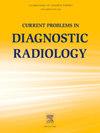向患者发布复杂的成像报告,放射科医生相信人工智能能提供帮助吗?
IF 1.5
Q3 RADIOLOGY, NUCLEAR MEDICINE & MEDICAL IMAGING
引用次数: 0
摘要
背景:根据《21 世纪治愈法案》的规定,放射科报告应立即向患者公布。然而,这些报告对于普通患者来说往往过于复杂,有可能导致压力和焦虑。虽然过去曾提出过患者门户网站或提供放射科医生联系信息等解决方案,但像 ChatGPT 和谷歌双子座这样的新型生成式人工智能技术可能会为患者简化放射科报告提供最便捷、最可扩展的方法。在此,我们收集了放射科医生对这种可能性的看法:方法:我们向大型学术医疗中心的所有诊断/介入放射科主治医师和临床研究员发送了一份包含八个问题的调查问卷:在我们的调查中(N = 52),52.8% 的受访者同意/非常同意患者应能立即获得他们的放射报告。只有 9.61% 的受访者认为非专业患者可以理解放射学报告。关于提高患者对放射学报告理解能力的潜在途径,使用人工智能简化报告并由放射科医生进行人工检查获得了最多的支持/强烈支持(46.2%)。在没有人工检查的情况下,对人工智能生成的简化报告的支持率降至(23.1%):结论:患者越来越多地获得放射学报告,但对于普通患者来说,报告可能过于复杂。最终,人工智能系统可能会帮助患者简化放射学报告,但目前放射科医生的支持率有限。本文章由计算机程序翻译,如有差异,请以英文原文为准。
Release of complex imaging reports to patients, do radiologists trust AI to help?
Background
As a result of the 21st Century Cures Act, radiology reports are immediately released to patients. However, these reports are often too complex for the lay patient, potentially leading to stress and anxiety. While solutions such as patient portals or providing radiologist contact information have been proposed in the past, new generative artificial intelligence technologies like ChatGPT and Google Gemini may provide the most accessible and scalable method of simplifying radiology reports for patients. Here, we gather the opinions of radiologists regarding this possibility.
Methods
An eight-question survey was sent out to all diagnostic/interventional radiology attendings and clinical fellows at our large academic medical center.
Results
From our survey (N = 52), 52.8 % of respondents agreed/strongly agreed that patients should have immediate access to their radiology reports. Only 9.61 % agreed that radiology reports are understandable by the lay patient. Regarding potential avenues to improve patient comprehension of their radiology reports, using artificial intelligence to simplify reports with a manual check by radiologists garnered the most support/strong support (46.2 %). Support of artificial intelligence generated simplifications dropped to (23.1 %) without a manual check.
Conclusion
Patients are increasingly gaining access to their radiology reports, but reports may be too complex for the lay patient. Eventually, artificial intelligence systems may help simplify radiology reports for patients, but there is currently limited support from radiologists.
求助全文
通过发布文献求助,成功后即可免费获取论文全文。
去求助
来源期刊

Current Problems in Diagnostic Radiology
RADIOLOGY, NUCLEAR MEDICINE & MEDICAL IMAGING-
CiteScore
3.00
自引率
0.00%
发文量
113
审稿时长
46 days
期刊介绍:
Current Problems in Diagnostic Radiology covers important and controversial topics in radiology. Each issue presents important viewpoints from leading radiologists. High-quality reproductions of radiographs, CT scans, MR images, and sonograms clearly depict what is being described in each article. Also included are valuable updates relevant to other areas of practice, such as medical-legal issues or archiving systems. With new multi-topic format and image-intensive style, Current Problems in Diagnostic Radiology offers an outstanding, time-saving investigation into current topics most relevant to radiologists.
 求助内容:
求助内容: 应助结果提醒方式:
应助结果提醒方式:


